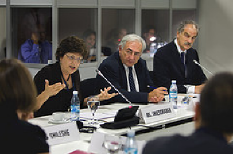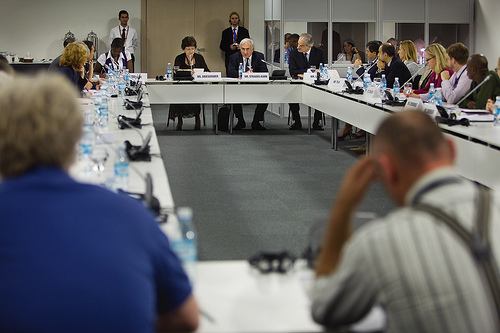
Jo Marie Griesgraber (l), Executive Director of New Rules for Global Finance Coalition, chairs meeting attended by IMF Managing Director Dominique Strauss-Kahn (c), First Deputy Managing Director John Lipsky in Istanbul (photo: Stephen Jaffe/IMF)
The IMF and Civil Society
IMF Governance Reform: Update from Istanbul
October 14, 2009
Civil society representatives met with the IMF Managing Director Dominique Strauss-Kahn to present their final report on IMF governance reforms at the 2009 World Bank and IMF Annual Meetings held in Istanbul.
Governance reforms were the centerpiece of the Fund’s interaction with civil society organizations (CSOs) during the recently concluded 2009 World Bank and IMF Annual Meetings in Istanbul. On October 1, the IMF Managing Director Dominique Strauss-Kahn held a meeting with 14 civil society representatives from around the world—the final step of a process that has come to be known as the Fourth Pillar.
The gathering was the culmination of a five-month consultation marked by unprecedented Fund cooperation with CSOs to prepare a report on governance reforms. The Fourth Pillar representatives, chaired by Jo Marie Griesgraber of the Washington-based New Rules for Global Finance coalition, presented their final report to the IMF Managing Director—just three weeks after they discussed their findings with the IMF Executive Directors. Participants in the meeting included representatives of the International Trade Union Confederation, Oxfam International, the Bretton Woods Project, and ActionAid Nigeria.
IMF governance reforms were also an important item on the agenda of the Annual Meetings in Istanbul. The October 4 meeting of the Fund’s ministerial-level International Monetary and Financial Committee endorsed a G-20 proposal to shift at least 5 percent of quota shares to dynamic emerging market and developing countries. In his opening speech to the Annual Meetings Plenary on October 6, Strauss-Kahn issued a strong call for rapid progress in this area.
A Historic Step
At the meeting, Strauss-Kahn welcomed the Fourth Pillar report and pointed to the areas in which the group’s recommendations were aligned with the ongoing reform process. He specifically singled out the Pittsburgh agreement as an historic step for the Fund. Strauss-Kahn emphasized that the Fourth Pillar will have an impact, although he acknowledged to the CSOs that change may “not be at a pace that you want.”
CSO representatives emphasized three areas of the report in their presentations: the need to change the existing quota formula and the distribution of seats on the IMF Executive Board; use of a double majority in Board voting procedures; and methods for strengthening Fund accountability for programs in borrowing countries and Executive Board accountability.
CSO participants stressed that the makeup of the Board was a crucial element of any reform process because the distribution of quotas have created an uneven weighting of voting power toward the advanced economies, particularly Europe. They called for a reduction in the number of European seats on the Board that would produce a consolidation of the European constituencies and for an end to the de facto U.S. veto. While CSO representatives recognized the significance of the Pittsburgh agreement, they also expressed considerable dissatisfaction with the decision to maintain the current formula for determining Fund quotas.
Responding to Concerns
The Fourth Pillar was originally proposed by the IMF in response to requests from CSOs for a role in the Fund’s governance reform process. Managing Director Strauss-Kahn envisioned the process as a complement to the existing work of the IMF’s Independent Evaluation Office, the Executive Board Working Group on IMF Corporate Governance, and an independent panel chaired by then South African Finance Minister Trevor Manuel.
Under the Fourth Pillar, CSOs, academics, and analysts submitted recommendations and information that culminated in the final report. Their deliberations were conducted through a website and international videoconferences facilitated by Fund staff.
In 2008, the IMF approved a reform in Fund quotas that shifted about 2.7 percent of voting shares toward the emerging market countries and developing economies. A majority of countries have not yet obtained final legislative approval of that agreement, and Strauss-Kahn told CSOs that it was essential for the membership to ratify the reforms. He subsequently appealed to the full membership in his plenary speech to take that action.

Jo Marie Griesgraber (L), Executive Director of New Rules for Global Finance Coalition chairs a meeting attended by civil society representatives and IMF 's Managing Director Dominique Strauss-Kahn (C) and the First Deputy Managing Director John Lipsky (R) at the International Congress Center October 1, 2009 in Istanbul, Turkey. IMF Staff Photo/Stephen Jaffe
